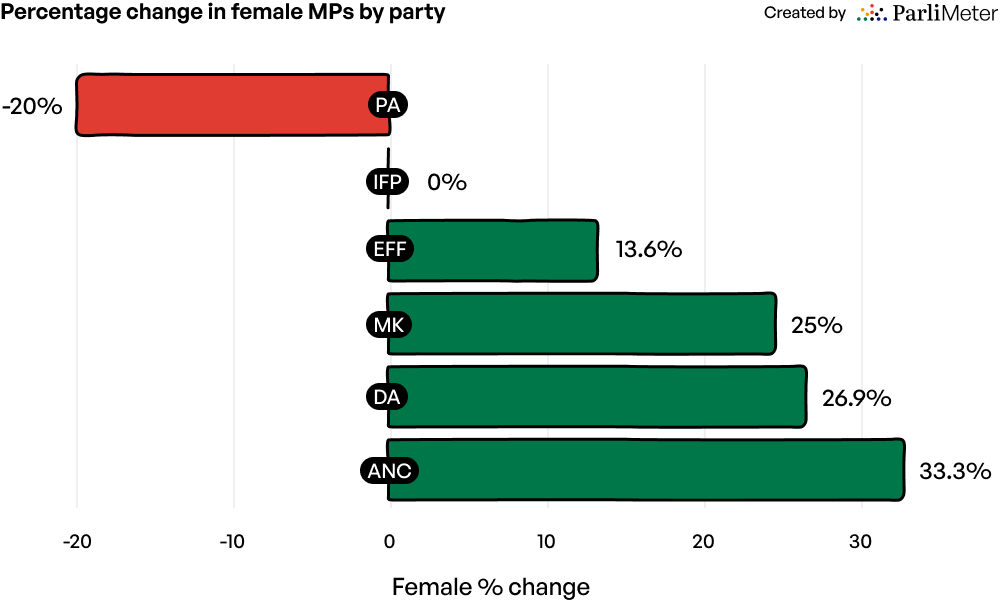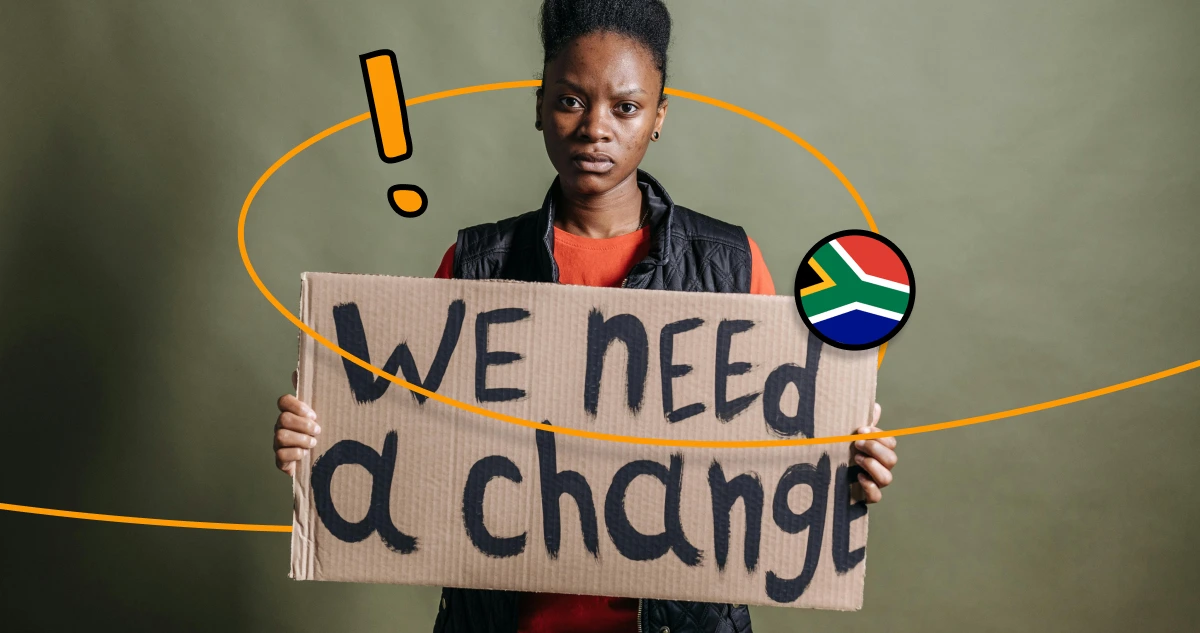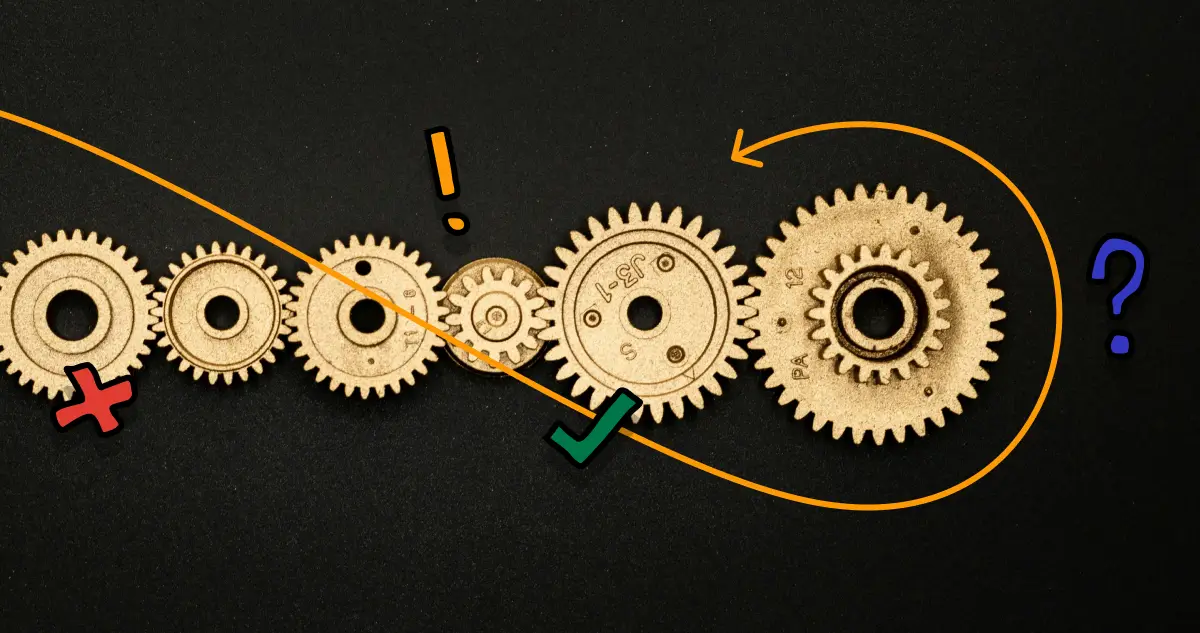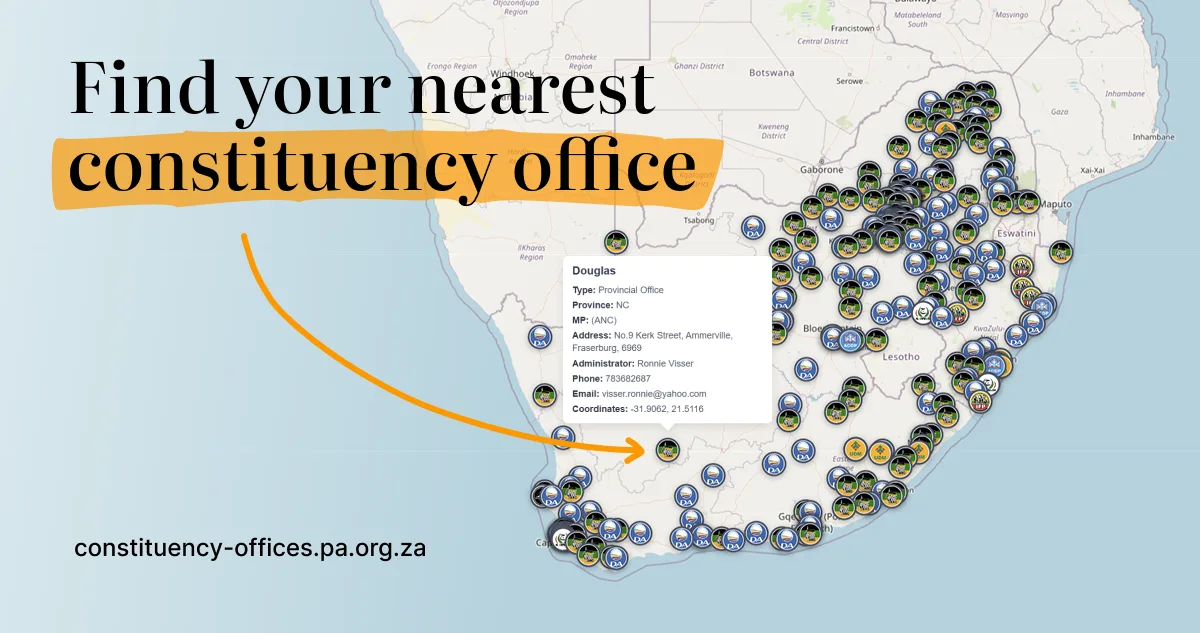We take a look at recent PMG data around gender to assess the representation of women in South Africa's parliament.
Women’s Month is an opportunity to assess the country's ongoing commitment to gender equity, particularly in Parliament. In a country where systemic inequality—rooted in both apartheid and patriarchal legacies—continues to shape governance and daily life, the question of gender representation in Parliament is not symbolic; it is structural.
Recent tracking by the Parliamentary Monitoring Group (PMG) offers an illuminating overview of the evolving gender dynamics in the Seventh Parliament. This tracking goes beyond a static snapshot and instead provides a dynamic view of how Parliament engages with gender equity, both in representation and action.
Women in Parliament: Representation in Membership
In February 2025, women made up just 36% of the National Assembly (NA). By July 2025, that number had risen to 44.6%, a significant increase over just five months. The improvement is due to membership changes from resignations, deaths, and loss of membership. The changes allowed political parties to reconfigure gender balances when appointing replacements, although we cannot confirm that gender balances were taken into consideration by the parties when making these replacements.
The picture is different in the second House - the National Council of Provinces (NCOP) - where women’s representation declined from 55.65% in February to 39.6% in July 2025.
Party-level Gender Representation (National Assembly)
At a party level, the ANC showed the most notable gain, growing its cohort of women MPs from 66 to 88, a 33.3% increase. The DA and MK followed with a 26.9% and 25% rise, respectively.


National Assembly Committees
The gender profile of committees did not change substantially, with only minor changes affecting most committees.
Over the six months of data tracking, the number of women chairs remained at 21 out of 48, or 43.75%.
While women chair several important committees, it is noteworthy that many of the high-profile (economics and security cluster) committees are chaired by men in the National Assembly: Finance, SCOPA, Justice, Trade, Industry and Competition, International Relations, Defence, Police and Health.
Leadership
Women occupy the most visible leadership roles in the legislature: the NA Speaker, Deputy Speaker and NCOP Chairperson are women.
Beyond this top layer, gender parity fades amongst the top 7 largest parties when it comes to the appointment of Chief Whips. Chief Whips play a central role in driving party discipline and parliamentary strategy. Some argue that this underscores the point that while women are present, they are often removed from the real centre of power.
Chief whips (National Assembly)
Highlights and overview of gender-related activities in the Seventh Parliament (Feb - July 2025)
Representation matters, but it must translate into gender-responsive governance. To measure this, we tracked gender-related activities across Parliament. These include committee meetings, written questions to ministers, plenary discussion and legislative business.
Overview of Committee meetings dealing with gender matters
Naturally, the dedicated committee for gender-related oversight is the Portfolio Committee on Women, Youth and Persons with Disabilities. Over the first six months of 2025, this Committee had meetings related to a briefing by the Commission for Gender Equality (CGE) on research relating to learner pregnancy, establishment of the National Council on Gender-Based Violence and Femicide, review of the implementation of the Beijing Declaration and Platform of Action and a meeting with provinces on the implementation of the sanitary dignity programme (SDP). The Committee also met with the South African Human Rights Commission (SAHRC) on the defunding of NGOs and its human rights impact (on women, youth and persons with disabilities). The Committee was briefed on the Mainstreaming Handbook: protecting and promoting the rights of women, children, persons with disabilities and youth in the Seventh Parliament and beyond while in June 2025, the Committee met with the CGE to discuss Men, Masculinities, and Gangs: Investigating the persistence of male gangs in selected provinces, and a Gender-Based Violence Index for South Africa. The Committee also met with National Treasury on gender-responsive budgeting.
The Joint Multiparty Women’s Caucus, which is a body that any Member of Parliament can participate in and is meant to mainstream gender and women’s interests in the legislature, met with SAPS and the Department of Justice and Constitutional Development (DoJ&CD) on progress and challenges in implementing GBVF legislation.
PMG also wanted to track the responsiveness of other committees to gender matters. In these six months, the Portfolio Committee on Correctional Services met with the CGE for a briefing on the Commission’s research and findings related to the Department of Correctional Services and the Select Committee on Security and Justice discussed gender matters as it related to the implementation of the Criminal Law (Sexual Offences and Related Matters) Amendment Act and forensic and DNA processing. The Portfolio Committee on Social Development was briefed by the National Development Agency (NDA) on its Turnaround Strategy and how it addresses skilling of women in SA, including victims of GBV - women and children, transitioning from places of safety into their communities. The Portfolio Committee on Agriculture met with the CGE on its research, investigative findings and recommendations on gender transformation and gender rights in Agriculture. The Portfolio Committee on Police met with the CSPS to discuss the SAPS’s compliance with the Domestic Violence Act and the SAPS’ plans to combat GBVF. The Portfolio Committee on Higher Education met with the CGE to discuss Sexual Harassment at Institutions of Higher Learning.
This illustrates that gender matters are not the sole responsibility of the “gender committees” but are mainstreamed across parliamentary oversight.
Overview of written questions related to gender
Written parliamentary questions are a vital mechanism for oversight, allowing MPs to demand direct accountability from Ministers. PMG tracked dozens of questions that touched on gender dynamics across various sectors. A sample of the issues raised between February and July 2025 includes:
- Gender disparities in spaza shop ownership (Small Business Development)
- Bullying and discrimination in schools (Basic Education)
- Barriers faced by women in the tourism industry (Tourism)
- The status of specialised GBV courts and Family Violence Units (Justice & Police)
- Protection of elderly women in township communities (Social Development)
- Withdrawal rates of GBV dockets and SAPS inefficiencies (Police)
- Witness protection and victim support post high-profile acquittals, including the Timothy Omotoso case (Justice)
- Questions around the functionality of national gender, youth and disability machineries, and their coordination at provincial levels (Women, Youth and Persons with Disabilities)
These inquiries demonstrate that gender-related concerns intersect.
International Women’s Day and Women’s Parliament
In 2025, the South African Parliament marked two key events focused on gender equality:
- International Women’s Day Debate (13 March 2025) under the theme “March forward, accelerate action for gender equality.”
- P20 Women’s Parliament (13–14 August 2025), themed “Accelerating Equality, Sustainability and Shared Growth.”
As the Seventh Parliament settles into its term, Women’s Month offers a reminder that real success is when rhetoric translates into tangible policy results or improved outcomes for women. Without measurable legislative follow-through, meaningful budgets, well-designed programmes or enforcement mechanisms, such events risk being performative rather than transformative.
PMG will continue to monitor and report on Parliament’s progress as the Seventh Parliament unfolds.

Work with us
We are looking for resource and data partners!
If you or your organisation would like to contribute or collaborate, please get in touch.
You might also like

Global Ethics Day 2025 and South Africa's Parliament

What goes into Monitoring Parliament? Behind the scenes with PMG’s Monitors!





